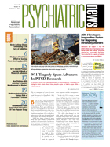Elderly women suffering from sleep-disordered breathing have an increased risk of developing cognitive impairment or dementia, finds a new study published in the August 10 Journal of the American Medical Association.
The researchers noted that cognitive issues identified during the prospective study appear to be associated with hypoxia rather than with the quality and duration of sleep.
"This study illustrates the importance of detecting breathing-related sleep disorders in older adults," said Charles Reynolds III, M.D., chair of APA's DSM-V Sleep-Wake Disorders Work Group and a professor of psychiatry at the University of Pittsburgh. "We have also noticed that many older adults with depression and cognitive impairment often have a breathing-related sleep disorder, which, if treated appropriately, can help improve both cognition and mood."
For the study, a team of researchers led by Kristine Yaffe, M.D., of the University of California, San Francisco's departments of Psychiatry, Neurology, and Epidemiology collected baseline data from in-home, unattended polysomnography tests. The team's sleep and cognition study pooled participants from an existing multisite study of community-dwelling older women.
Over a period of approximately five years, the participants were given neuropsychological tests to assess their cognitive status. Ultimately, the researchers evaluated data collected on 298 women, more than 35 percent of whom were identified as suffering from sleep-disordered breathing. A majority of the participants (more than 90 percent) were white, and their mean age was 82.3.
While the baseline data revealed no significant difference in the cognitive functioning between the cohorts with and without existing sleep-disordered breathing, nearly 36 percent of the participants ended up developing either mild cognitive impairment or dementia. Approximately 45 percent of the women identified as having "prevalent sleep-disordered breathing" developed mild cognitive impairment or dementia compared with approximately 31 percent of those exhibiting normal nighttime breathing.
Since the study findings demonstrated a consistent correlation between hypoxia measures and the subsequent development of cognitive impairment, the researchers suggested that further investigation of continuous positive air pressure (CPAP) treatment be undertaken. According to the researchers, earlier studies have shown CPAP to be effective in slowing or even improving the cognitive impairment of Alzheimer's patients with sleep-disordered breathing, as well as in improving the cognitive functioning of those suffering from sleep apnea.
Yaffe and her team recommended that further studies looking into the connection between sleep-disordered breathing and cognitive impairment should involve "larger sample sizes, longer treatment periods, and more diverse populations."

